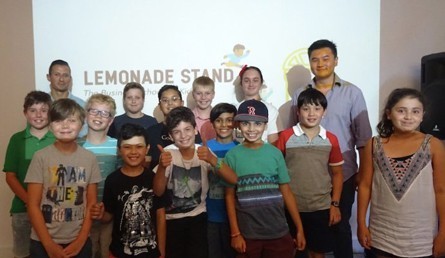
We should ask students what they want to create when they grow up not what they want to be – this was the mantra of Lemonade Stand, the two day business building program for kids run by Collective Campus.
Lemonade Stand brought together 13 10-year-olds from different backgrounds and parts of Melbourne to develop their entrepreneurial mindset and capabilities.
CEDA recently released a report which found that 40-60% of Australian jobs will be replaced in the next 10-15 years, with technology and offshoring driving these changes.
As such, the need for today’s children to be adaptable and develop the ability to reinvent themselves has never been greater – there’s no longer such thing as a “sure bet” when it comes to occupations.
Our program combined a healthy dose of theory with practical hands on application and fun in order to support engagement for nine-hour days – 50% more than what they’re used to at school.
We first got the kids to draw the future, which delivered some very interesting insights into the way children that have grown up with technology think.
Robots, teleportation systems, drones and hover-bikes were some of the features of tomorrow’s landscape with some of the darker drawings encompassing robots taking over.
We then delved into business fundamentals 101 and got the class to develop their understanding of different concepts such as products & services, business names and branding, customers and financing and budgeting.
We used a lemonade stand as a case study to help hone the children’s understanding of these different concepts.
On day two we dived into Lean Startup for Kids and the whole point of this exercise was to make them comfortable with concepts such as embracing small failures as a means of learning in order to make critical changes to their business models.
We were quite encouraged when one of the parents dropped off their child for day two and said: “the first thing he said when he got home was that it’s OK to fail as long as you fail small and learn and have enough money left over to make changes”.
This mindset is a far cry from the ‘avoid failure at all costs’ mantra that is the social norm throughout schooling and the workplace. But if we only ever take safe bets and avoid the path less travelled, we are unlikely to differentiate ourselves and almost sure not to innovate.
Once children had honed in on a number of problems, they were introduced to ideation tools such as analogs and antilogs, the strategy canvas and the innovation card game, GEElab’s Futuredeck.
Having decided on a solution, we guided the class through the completion of a business model canvas and subsequently, prototypes, which included mobile apps, web prototypes, Lego prototypes, Play Doh prototypes and perhaps the most exciting for the class, 3D-printed prototypes.
After all of the hard work of identifying problems, designing solutions, defining business models and developing prototypes, we asked the kids to develop pitch decks to present their ideas to the teachers, parents and resident startups at Collective Campus, which were an overwhelming success, scoring rave reviews from all in attendance.
It’s obvious to us that kids really enjoy learning about business if it is pitched at the right level and with the right tools. The concept of empowering themselves to build whatever they want is a compelling one for all concerned.
It’s encouraging that the federal government’s Policy Hack initiative singled out running a national Lemonade Day in schools to teach children business and embed entrepreneurship in the broader education curriculum.
We are happy to be playing our part in this initiative by taking charge and delivering a program that both children and parents thought was a success.
Practicing what we preach at Collective Campus, we learned a lot from the experience – what went really well, what could be improved, what didn’t work so well – and will take these learnings into subsequent iterations of the program.
It took us four months to go from idea to delivery, notwithstanding the fact that our primary focus and majority of our time is spent on innovation consulting for large organisations and educational workshops and events for adults, leaving little time for anything else.
This is a testament to the startup and entrepreneurial mindset which is all about “getting shit done” and learning by doing, as opposed to paralysis by analysis and delayed, outsourced decision-making which is prevalent across many sectors of our economy.
In an age when lost productivity costs the Australian economy more than $305 billion each year, teaching our next generation how to move with the speed of a startup and empower themselves to take control and make decisions cannot come soon enough, particularly where the rate of technological disruption and change means that standing still is not an option.
We need to encourage discovery, not just delivery, among today’s youth and we welcome other organisations to join the movement and foster a change in mindset amongst tomorrow’s leaders.
Steve Glaveski is the chief innovation consultant at Collective Campus. This piece was originally published on the Collective Campus blog.


COMMENTS
SmartCompany is committed to hosting lively discussions. Help us keep the conversation useful, interesting and welcoming. We aim to publish comments quickly in the interest of promoting robust conversation, but we’re a small team and we deploy filters to protect against legal risk. Occasionally your comment may be held up while it is being reviewed, but we’re working as fast as we can to keep the conversation rolling.
The SmartCompany comment section is members-only content. Please subscribe to leave a comment.
The SmartCompany comment section is members-only content. Please login to leave a comment.